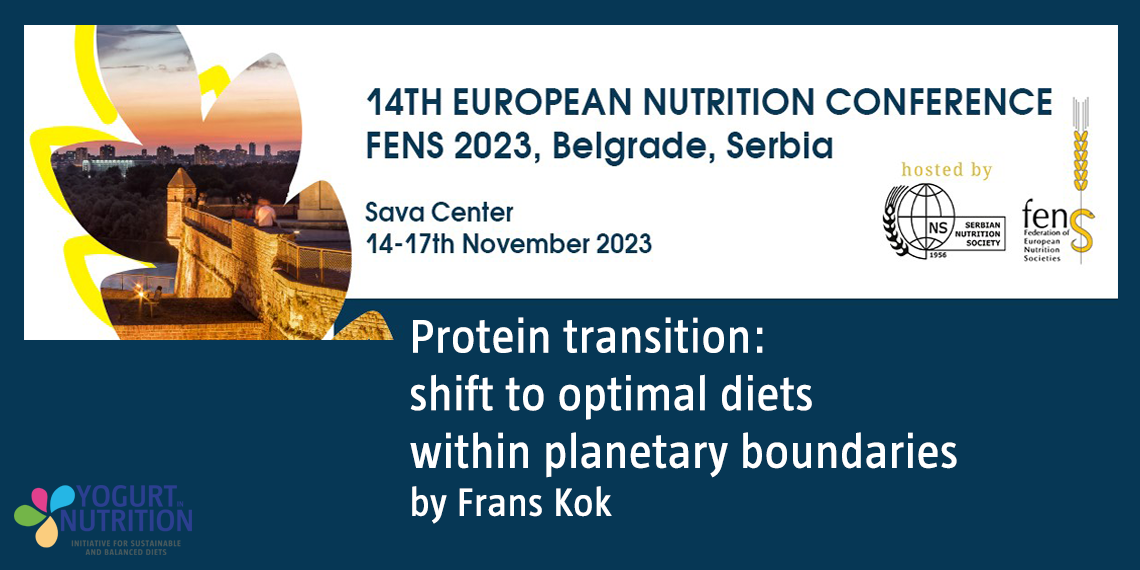In the session “Plant-based diets: transition to a healthy plate and planet”, Pr. Frans Kok talked more specifically about: “Protein Transition: Shift to Optimal Diets within Planetary Boundaries”.
“Protein transition”, briefly
The choice of food groups has a significant impact on both our health and the environment. The concept of “sustainable healthy diets,” as outlined by the World Health Organization (WHO) or exemplified by the planetary health plate (EAT-Lancet reference diet), involves considering four key dimensions: health/nutrition, economic factors, environmental sustainability, and socio-cultural aspects.
When focusing on the health and nutrition dimension, modeling studies highlight some alerts on nutritional adequacy for specific diet models:
- Vegetarian diets should pay attention to protein quality, omega-3 fatty acids, vitamins B12 and D, as well as calcium, iron, and zinc.
- Vegan diets are associated with lower protein intake/quality, lower omega-3 fatty acids, and deficiencies in vitamins B2, B3, B12, and D, as well as iodine, zinc, calcium, potassium, and selenium.
Regarding the nutritional adequacy of plant protein alternatives, key considerations include:
- The composition of essential amino acids.
- The digestibility of indispensable amino acids (DIAAS).
- The bioavailability and effects of anti-nutritional factors.
- The impact of processing, especially in the context of ultra-processed foods and their effects on health.
Key Messages :
- Flexitarian and territorial diets, which involve a reduction in animal products, may offer an optimal balance between human and planetary health.
- While vegetarian and vegan diets are highly effective for sustainability and health, careful planning is necessary, especially for children, pregnant/lactating women, and the elderly.
- The evaluation of the nutritional quality of plant-based protein alternatives should consider not only the product level but also the meal level.
- The ongoing debate on ultra-processed foods (UPFs) is counterproductive to the urgent need for a transition in the food system.
Learn more with Frans Kok
Hello, can you introduce yourself?
Frans Kok: My name is Frans Kok, and I am an emeritus professor in Nutrition & Health at Wageningen University. I am currently retired. I serve on the YINI scientific committee, where I’ve had the pleasure of engaging in enriching discussions and presentations.
If we want to shift to a more plant-based diet, how can we maintain optimal protein intake while taking into account sustainability?
Frans Kok: In Western societies, protein intake is generally sufficient for most people, so shifting towards a more plant-based diet is feasible without compromising on protein needs. When incorporating plant-based protein alternatives, it becomes crucial to consider essential amino acids. Fortunately, achieving a well-balanced amino acid profile is entirely achievable. Additionally, when developing alternative products, attention must be given to the micronutrient content, aligning with specific nutritional goals.
The key is to ensure an adequate supply of essential amino acids and micronutrients.
What would make an ideal plant-based protein?
Frans Kok: Crafting an ideal plant-based protein involves creating blends or mixtures from various plant protein sources. Evaluating the digestibility and the contribution of amino acids is a critical step in this process. There’s a wealth of choices when it comes to plant-based sources, allowing for versatility and adaptability.
It’s essential to conduct thorough testing, not only for digestibility but also for bioavailability. This involves understanding how the product interacts when consumed with a meal—ensuring it still facilitates the absorption of micronutrients and amino acids.
To find out more:
- Interview of Prof. François Mariotti towards a more plant-based diet in our plates
- Towards a more plant-based diet (infographic), showing the composition of optimized plant-based meat substitute
Frans Kok is emeritus professor in Nutrition & Health and former head of the Division of Human Nutrition at Wageningen University, The Netherlands. He was trained in human nutrition in Wageningen and epidemiology at Harvard University, Boston USA.
Kok’s scientific research covers topics such as diet in disease prevention, dietary behaviour, and overweight. In emerging economies in Asia and Africa attention is on diet and deficiency disorders.



